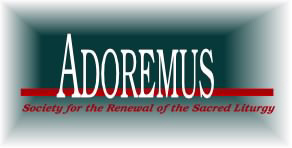
Adoremus, Society for the Renewal of the Sacred Liturgy
Pontifical Council for the Interpretation of Legislative Text
Answer to query on Confessionals: Can the priest decide that sacramental confession is to be received in a confessional with a fixed grille?
The following notice was published, July 24, 1998 by the Vatican Information Service:
The Pontifical Council for the Interpretation of Legislative Texts, with the Holy Father’s approval, in a recently-published note, responded affirmatively to the following inquiry by several episcopal conferences regarding confessionals:
"If, according to Canon 964, paragraph 2, of the Code of Canon Law, the minister of the sacrament, for a just cause and excluding cases of necessity, can legitimately decide, even in the eventuality that the penitent ask for the contrary, that sacramental confession be received in a confessional with a fixed grille."
***
Canon 964
§1: The proper place to hear sacramental confessions is in a church or oratory.
§2: The conference of bishops is to issue norms concerning the confessional, seeing to it that confessionals with a fixed grille between penitent and confessor are always located in an open area so that the faithful who wish to make use of them may do so freely.
§ 3: Confessions are not to be heard outside the confessional without a just cause.
***
Comment: This response of the PCILT (reported above) affirms that a priest who hears confessions has the right decide to hear only anonymous confessions (with the penitent behind a fixed grille), and may not be compelled to engage in the "face-to-face" form of administering the sacrament of penance.
Background to the question addressed to the PCILT is that some priests had expressed concern about the potential for abuse of the "face-to-face" form of confession, and a reluctance to be placed in a situation where there could be any possibility for inappropriate communication of any kind, either on the part of the priest or of the penitent.
Some had held that only the penitent (not the priest-confessor) had the right to make a decision about whether to confess anonymously (within the fixed-grille confessional) or "face-to-face" in a "reconciliation room".
***



